WinHEC 2005 - Keynote and Day 1
by Derek Wilson & Jarred Walton on April 26, 2005 4:00 AM EST- Posted in
- Trade Shows
Beyond XP-64
XP-64 wasn't the only major topic covered in the keynote. The other major topic was the next generation of Windows, codenamed Longhorn. There were several demonstrations of Longhorn features and capabilities, although there really wasn't a whole lot of new content shown. Gates also showed off several of the new tablet PC devices, but again, there wasn't anything really amazing to report. Here are a couple of gratuitous shots of these devices before we move on to Longhorn.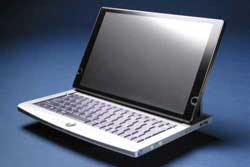 |
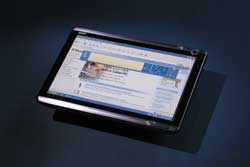 |
For those of you that know nothing about Longhorn, here are a few of the interesting tidbits. For starters, Longhorn will release simultaneously in 32-bit and 64-bit versions. In other words, 32-bit OS and system support will continue for quite a few more years, as Longhorn isn't scheduled to ship before the holiday 2006 time frame. Longhorn will also represent the most significant redesign of the Windows UI since the upgrade from Windows 3.1 to Windows 95 - or at least, that's what Microsoft is claiming.
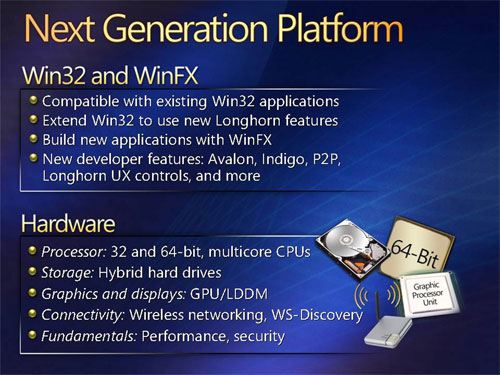
The above represents the broad plans for Longhorn in terms of features and hardware. WinFX is one of the core changes, and it relates to the way all of the GUI functions will be handled. 3D hardware acceleration with pixel shaders, alpha blending (transparency) and other graphical effects - a cynic might suggest that many look like stuff we've seen in OS X - are going to be a major part of the new OS.
One of the interesting points is that the graphics in Longhorn will be vector based, allowing for zooming effects without the pixelization that we get with the current model. This extends even further to areas like the new Metro document format. Metro is a royalty free standard based off of XML that Microsoft has created for Longhorn. The idea is that it will allow better translation of documents between various formats.
To illustrate this, MS gave a brief demonstration of a prototype printer with hardware support for the Metro format, with an example of a PowerPoint slide printed using the current driver model as well as the new Metro model. Frankly, we're not sure what the point was with the demonstration, other than to show that some programs don't print properly - PowerPoint apparently being a culprit. Anyway, Metro sounds like a new take on the PostScript concept, only without royalties. Royalty-free isn't a bad idea, certainly, but this feels quite a bit like the old browser wars. Take something another company makes for free and clone it, then integrate it into the Windows OS and give it away for free. Consumers might like it, but competitors don't all benefit from the decisions.
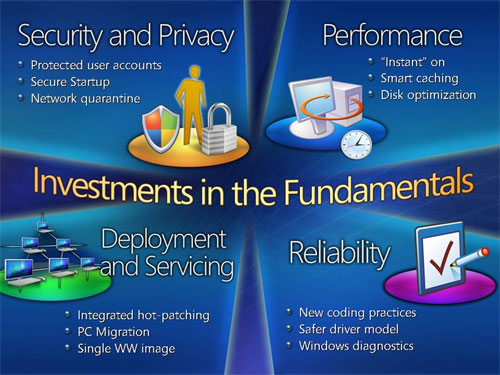
The purpose of Longhorn as a whole continues to be improving the computing experience, with security, performance, reliability, and service all playing a role. In order to realize this goal, changes are coming with Longhorn. One of the major changes will be the new driver model and certification program. We'll have more to say on that later.
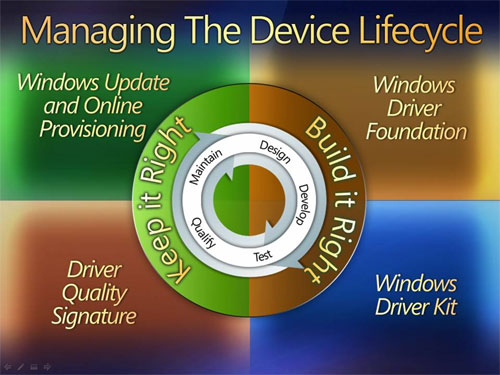
Windows Update will also be getting a renovation, with improved support. Gates suggested that in the future, users will all run WHQL certified drivers because there will be no need to use unsigned drivers. Hopefully, that will come by improving driver quality rather than by relaxing the requirements to gain certification.










36 Comments
View All Comments
PrinceGaz - Tuesday, April 26, 2005 - link
from page 3 "...and with the largest readily available DIMMs currently coming in at 2 GB in size"in reply to #5, #6 - Crucial have had 4GB PC2100 DIMMs available for purchase from their website for quite some time. They're certainly not cheap, but they are readily available. If you've got the cash I'm sure they'll sell you a few dozen of them.
DerekWilson - Tuesday, April 26, 2005 - link
MS may have needed to restrict 64bit to long longs due to some internal operating system code issues ... If, in fact, linux distros that run on x86-64 impliment 64bit longs this may be the case. Otherwise I'd lean towards a hardware issue.At this point I haven't looked into it, but I will be sure to ask around (as this is surely the place to do it).
bobsmith1492 - Tuesday, April 26, 2005 - link
Melgross - is that English?? I read it over real quickly and it was like... dude, what's he talking about? It just took a good close look though. :Pmelgross - Tuesday, April 26, 2005 - link
MS wants to control whatever they can. Control graphics memory and we are another step towards commoditized graphics boards.I wonder why MS went the way they did with the 64 bitness of the system. They went to (LL)P64 where just the long longs and the pointers are 64 bit, rather than LP64, where the longs are also 64 bit.
They are the only ones to do that. It seems like a half measure. A conversion from any Unix distro (or OS X) would need more work than is good, as well as a lessening in it's effectiveness as a 64 bit system. Are the 64 bit extentions of the x86 chips at fault?
JarredWalton - Tuesday, April 26, 2005 - link
Okay, the typos are fixed, and those that didn't like the 8-bit PNG graphics should now be happy. Iit was 4:30 AM when we finished, so our judgement was a bit impaired.) Just don't complain about how the PNGs are now five times as large. :)My personal opinion is that Windows XP removed most of the problems with the Windows platform. We'll see how Longhorn works out when it gets here, but that's still almost two years off. The graphics effects are nice, but pretty much totally unnecessary. Hopefully, we'll see some true improvements in the overall performance and not just eye candy.
Googer - Tuesday, April 26, 2005 - link
Linux on a MAC: Total freedom from with in a confined space.DerekWilson - Tuesday, April 26, 2005 - link
tbh, with the current state of things Linux game performance is not up to par with windows. Even with windows managing graphics memory, windows performance will likely be better.And from a workstation perspective, having virtualized graphics memory for free is more of a blessing than a curse.
I do think it would be better if MS gave graphics developers a choice whether to allow windows to manage graphics memory or not...
Son of a N00b - Tuesday, April 26, 2005 - link
dont you dare go screwing up the performance of my vid card ms...if you do im going linux...suryad - Tuesday, April 26, 2005 - link
Agreed. Windows should not be managing graphics ram...unless MS came up with some new techniques...MS seems to be pulling out all the stops though in my opinion. I think the hybrid drive is a good idea but like #12 said...that is quite a concern!Cygni - Tuesday, April 26, 2005 - link
#10's post makes me giggle.